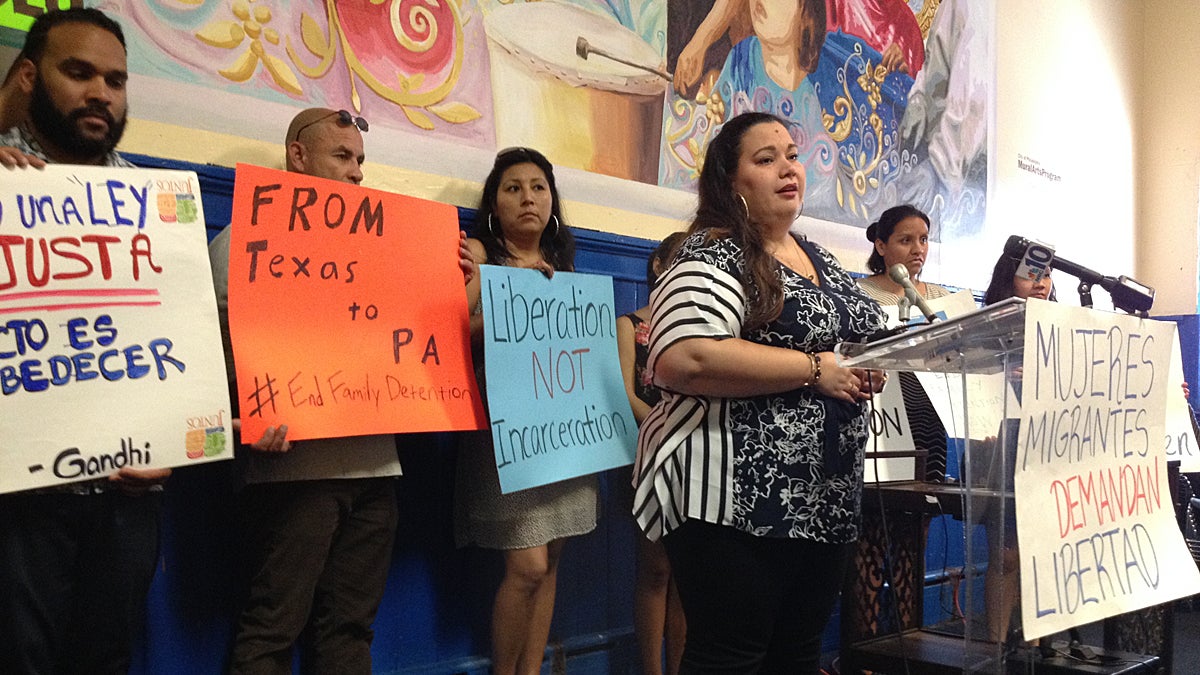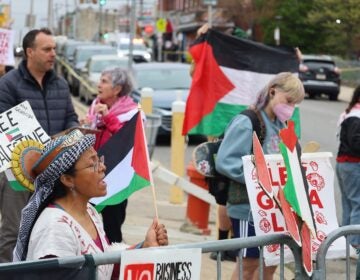Protesters call for closing immigrant family detention center in Berks

Erika Almiron, executive director of Juntos, a Latino community advocacy organization, calls for the closing the Berks Family Detention Center and the release of its residents. (Bill Hangley/WHYY)
Ten women at a Pennsylvania detention center for undocumented immigrants are staging a work stoppage to protest what they say are inhumane conditions.
They’re hoping to shut down the center and two others that are the targets of increasing scrutiny.
“We are fighting to close this facility as part of a larger movement to close all these facilities,” said Caitlin Barry, an attorney representing one of the women. “They can build all the playgrounds they want — a golden cage is still a cage.”
The Berks Family Detention Center in Leesport, Pennsylvania, and two others in Texas were created to give undocumented immigrants and their children a safe place to stay while their cases were resolved.
But advocates say the centers have turned into prisons by another name. “We have been fighting over the last couple months to highlight the human rights abuses,” said Erika Almiron, head of the Latino community advocacy group Juntos, citing lengthy detentions, reports of poor health care and violence.
“The women on the inside are paid a dollar a day — about $7 a week for cleaning, doing dishes,” said Almiron. “They’re launching the strike until the center is shut down.”
Center residents live under constant surveillance, said Barry, in “degrading conditions.” Originally intended as short-term accommodations, the centers now house many families for a year or more. Working for the center is their only means to make any money at all.
“It has been an incredibly difficult and traumatizing experience for them, particularly given what they have been through,” said Barry, whose client arrived a year ago from Honduras with a young daughter to seek political asylum.
“Not having any control over their own time [or] over how she cares for her daughter, is incredibly demeaning and frustrating for her,” Barry said.
The increasingly crowded centers have been the subject of growing scrutiny, particularly where the quality of life of the resident children is concerned. But information about conditions inside is hard to assess. Access to the public or media is heavily restricted.
Immigration officials did not immediately respond to a request for comment, but in the past they’ve called the Berks center “effective and humane. “
However, court-ordered negotiations are under way at the federal level to upgrade the centers.
The women’s protest caught the attention of Philadelphia Councilwoman María Quiñones-Sánchez, who said that the policy of allowing lengthy detention “stands against everything this great country and state represent.”
She cited the workers’ low wages and reports of poor medical treatment for children, and called on her fellow legislators to “support these women and to do everything in their power to close down the Berks Detention Center permanently.”
WHYY is your source for fact-based, in-depth journalism and information. As a nonprofit organization, we rely on financial support from readers like you. Please give today.




